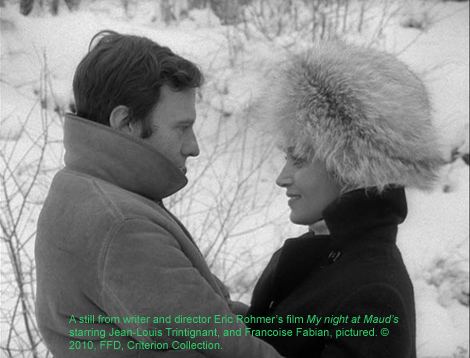
One of the finest filmmakers of our time, Eric Rohmer, also
one of the founding leaders of the French New Wave movement in
motion picture, passed away last month, he was 89. Born
Jean-Marie Scherer, in Nancy, France, Eric Rohmer taught French
and German literature for some time, then went on to pursue a
career in journalism. After moving to Paris, and getting
recognition for a film review he wrote, he then enrolled in some
film classes, and fell in love with the craft of movie
making.
In 1950, he self published the Gazette due Cinema with directors
Jean Luc Godard and Jacques Rivette, and later wrote for, along
with Andre Bazin, Godard, and Francois Truffaut, the influential
film journal Cahiers du Cinema. It was here that the group founded
the modern film criticism theory that motion picture can be
effectively critiqued based on the personal life and philosophy
of the director. This led to the auteur theory of filmmaking,
which holds that the director is the leader and visionary of the
film, not the actors, and that the talent is subordinate to the
vision of the filmmaker.
Rohmer, along with Jacques Rivette, Jean Luc Godard, Francois Truffaut, Claude Chabrol, and critic Andre
Bazin, spearheaded the movement of film that would come to be
called French New Wave. Its movement actually extended to
neighboring European countries as well, and even the U.S, with
films such as Vilgot Sjöman’s I am Curious Yellow
among others works. French New Wave was and is defined by many
aspects, coming out of noir and German Expressionism, with darker
subject matters, often taboo or erotic themes, Freudian,
psychological, or philosophical themes, and more daring shots
among more.
In New Wave, dialogue and the story of the auteur director is
king. It often incorporates philosophical, existential, radical
poetics in to the dialogue, and often merges many styles such as
action, romance, tragedy, or comedy in the same scene. Whereas
most Hollywood films cut on the beginning and end of action,
French New Wave often may begin coverage of a scene before and
after any primary action, which creates more poignancy, realism,
and portrayal of motivation for the character.
Eric Rohmer, who also produced and acted, achieved most
recognition for his profound work as a writer and director. He
wrote over 30 films, and directed over 50 motion pictures. With
such classics as Pauline at the Beach, Love in the Afternoon, My
Night at Maud’s, and Claire’s Knee among many others,
his films often celebrated female sensuality, love, and freedom,
with emotional and gender conflicts often at play.
French President Nicolas Sarkozy stated of the director,
“Classic and romantic, wise and iconoclastic, light and
serious, sentimental and moralistic, he created the
‘Rohmer’ style, which will outlive him.” The
Hollywood Sentinel states, “The life of Eric Rohmer leaves
us with his work, a great contribution to the world of
cinema.”
© 2010, The Hollywood Sentinel, All rights reserved.